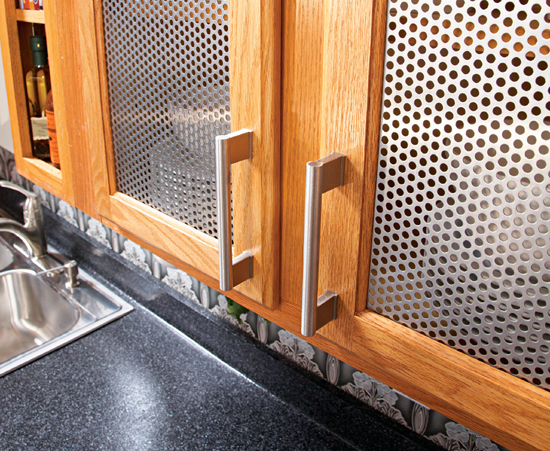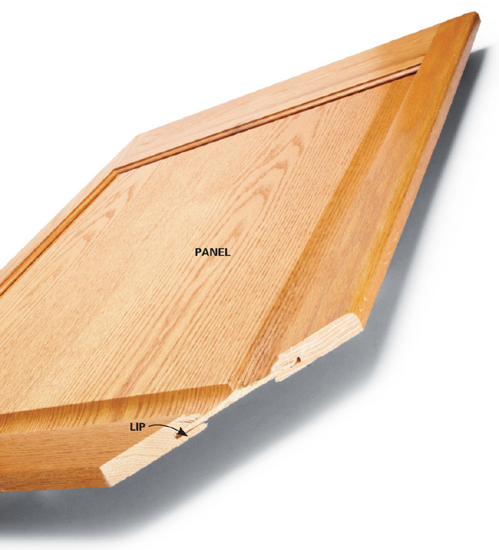

WHAT IT TAKES
Time: 2 hours
Skill level: Intermediate
Installing new panels in old cabinet doors can really dress up a kitchen (and new panels are a lot cheaper than new cabinets). Insert materials include glass, translucent plastic, copper, metal, fabric, wicker and many others. Adding “feature” inserts to just one or two of your cabinet doors can be striking and very inexpensive.
To cut away the lips that secure the door panel (Photo 1), you’ll need a pattern bit—a straight router bit with a bearing that’s the same diameter as the cutting diameter (see photos). You can buy a pattern bit for about $25, but most are too long to use with a 3/4-in.-thick guide. You may have to shop online to find a shorter bit with a cutting depth of 1/2 in.
If you’re working with just one or two cabinet doors, the only guide you’ll need is a straight board. If you have a stack of doors to rout, a more elaborate guide will save you time (Photo 2). The stops automatically position the guide without measuring, and you can rout two sides without repositioning.
Examine the back of the door before you rout. If you find any nails, pull them out so they don’t chip your router bit. Before you start cutting, set your router depth so the bit just touches the panel. After you cut away the lips, simply lift out the door panel. The router bit will leave rounded corners at each corner of the door frame; square them off with a chisel or utility knife.
Prefinish 1/4-in. quarter-round molding and use it to secure the inserts (Photo 3). When you place the insert into the door frame, make sure the punched side is face up (the punched side will feel slightly raised around the holes). Fasten the quarter-round with 5/8-in. nails or brads. If you don’t have a brad nailer or pinner, you can use a hammer; just be careful not to dent the metal.
Some home centers carry sheets of metal (including perforated) and will cut them for you for a small fee. But you’ll find a much bigger selection online. Look for metal in the 16- to 20-gauge range. The metal inserts shown here were purchased from an online dealer and were ordered over the phone.
Do your measuring after you remove the cabinet doors to get accurate insert measurements. Order inserts 1/8 in. shorter in both the length and the width so the inserts just fit in the opening. If stainless is out of your price range, consider aluminum or plain steel (called “mill finish”). You can spray-paint your metal any color you want. No matter what finish you order, wash the metal with paint thinner to rinse off the manufacturing oils. If you choose not to paint the steel, spray it with a clear lacquer to prevent it from rusting

Full Cloverleaf

Grecian

Windsor

Hexagonal

A door panel fits into grooves in the door’s frame. To remove a panel, just cut away the lips on the back of the door.
Run a pattern bit along a guide to remove the lips. Any straight board will work as a guide, but an L-shaped guide with stops speeds up the job.